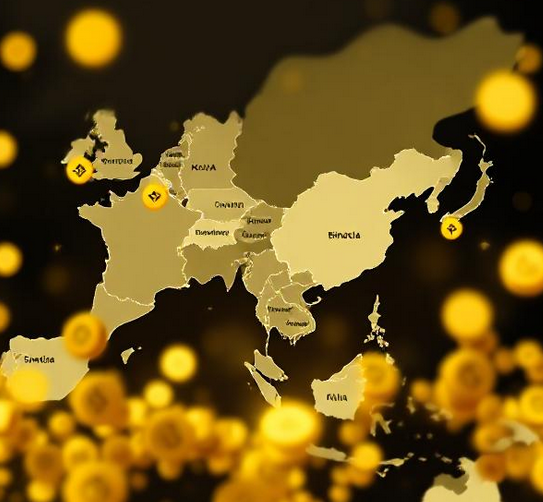WHEN DEVELOPING COUNTRIES START PLAYING BNB
“A Note from an Amateur Who Feels Like an Economist But Still Goes to Coffee Shops”
Opening: Crypto Drama from Developing Countries
Every time I read crypto news, I often think: “Is this the real world or an afternoon soap opera?”
Just yesterday, the price of BNB (Binance Coin) was calm, then suddenly it shot up because they heard a developing country was starting to adopt it.
It's like a domino effect, bro—one country starts to “believe,” other investors immediately rush in to buy.
So let's discuss this version of the common man who pretends to understand the digital economy, but still with a relaxed style, coffee shop logic, and a few meaningful jokes.
What's Going On?
BNB's rise isn't just due to hype, but also due to some important news:
- Bhutan (a small country in South Asia), through its Gelephu Mindfulness City project, is reportedly planning to include crypto (including BNB) in its national reserve assets.
- Large institutions are also starting to buy BNB, reportedly to "diversify digital assets."
- Predictions from major financial institutions like Standard Chartered even suggest BNB could reach around $2,700 by 2028.
Now, for other developing countries—like Indonesia, the Philippines, Nigeria, or Vietnam—Bhutan's move could spark curiosity:
"If they can adopt it, why can't we?"
What Is Crypto Adoption by Developing Countries?
In short: adoption means the government or citizens in that country begin to use, store, or regulate crypto in their financial system.
But the levels vary, bro:
- Government adoption: crypto is made part of reserves, taxes are received in crypto, or legality is clear.
- Citizen adoption: people use crypto to send money, invest, or trade digital goods.
- Ecosystem adoption: the emergence of local startups, blockchain projects, or innovation-friendly regulations.
BNB itself is unique because it has its own Binance Smart Chain (BSC) ecosystem — many DeFi projects, new tokens, DEXs, NFTs, and even GameFi are based there. So it's not just a coin for trading.
Impact of BNB's Rise in Developing Countries
1. Price Rises Due to Real Demand
If developing countries start buying or using BNB, demand automatically increases. Furthermore, BNB has a burn system (token destruction periodically), so supply decreases → the price becomes scarcer → the psychological effect of FOMO becomes even worse.
2. Strengthening Legitimacy
BNB is becoming increasingly accepted not just as a "Binance baby coin" but as a global digital asset.
If official institutions get involved, smaller countries might follow suit, retail investors become more confident, and a domino effect occurs.
3. Entering the Real Economy
Imagine a future where Indonesian migrant workers' remittances are sent using BNB.
Or freelancers' payments abroad via BNB Chain.
Sending costs are reduced, the process is fast, and hassle-free.
But yes, a system like this requires extra education and security to prevent it from becoming a breeding ground for scams.
4. Potential Domino Effect on the Local Digital Economy
If adoption truly takes off, many local sectors will benefit:
Developers create local DeFi projects
MSMEs start accepting crypto payments
Local blockchain communities grow
Startups start getting funding through tokenization
⚠️ Risks & Challenges
1. Volatility (Crazy Price Fluctuations)
Crypto isn't a BANK deposit, bro.
Today it could be lush green, tomorrow it could be red like Padang chili sauce.
If the government or local investors aren't mentally prepared, it could cause mass panic.
2. "Gray" Regulations
In many developing countries, crypto laws are still unclear.
Sometimes it's allowed, but the taxes are unreasonable.
Sometimes it's prohibited, but the officials have them. ????
3. Minimal Security and Education
Many people still:
- Don't understand private keys
- Send the wrong address
- Get scammed by fake giveaways
- Save seed phrases in your phone gallery
- That's why mass adoption without literacy is dangerous.
Strategies and How to Overcome This Situation
Okay, bro, this part is important. If you want to take advantage of the momentum of BNB rising due to adoption in developing countries, but still want to be safe, here are some "amateur but logical" strategies:
1. Don't Go All-In
Even if it's hype, don't go all-in.
The sanest strategy: scaling in — buy a little bit at a time when the price drops, not buy it all at once at the top.
2. Diversification
Don't get stuck with one coin.
Even though BNB has potential, still divide your funds among other assets (ETH, BTC, stablecoins). This way, if BNB falls, your wallet won't collapse completely.
3. Monitor Local Regulations
Pay attention to news from Bappebti, the Financial Services Authority (OJK), or relevant ministries.
If the government starts supporting blockchain adoption, that's a positive sign.
But if they start talking about "restrictions," be prepared to put up a buffer first.
4. Use BNB Productively
Instead of just holding it, you can:
Stake it on official platforms (earn yield)
Use it on DEXs for farming
Use it for transaction fees for personal projects
This way, you get utility, not just price speculation.
5. Use Developing Country Sentiment Is Momentum, Not a Permanent Benchmark
If a country starts adopting, don't immediately think "BNB is going to go up." Look at the data, capitalization, and global market reaction. Use the momentum to take a strategic position, don't follow the hype.
Explanation of Several Terms (to avoid confusion):
Term Meaning Casual. Institutional Adoption When large institutions (banks, companies, countries) start using or investing in crypto. Token Burn The process of destroying tokens to reduce the supply (to prevent the price from falling easily). FOMO (Fear of Missing Out) The fear of missing out on a trend, causing people to buy without thinking. DeFi (Decentralized Finance) A digital financial system without banks, based on smart contracts. DYOR (Do Your Own Research) Do your own research, don't just trust what others say. HODL A term for "holding coins" despite market volatility


Comments
No comments yet. Be the first to comment!
Leave a Comment